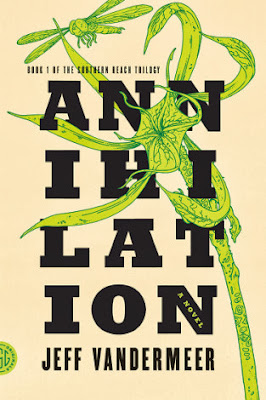(from kirkusreviews.com
by Marc Savlov)
Jeff VanderMeer photographed by Francesca Myman.
Set in a dystopian future where something unknown has begun to infest the Eastern Seaboard of the country, Philip K. Dick Award-winning author, essayist and all around master of the literary headtrip Jeff VanderMeer's Annihilation is simply unlike anything you've read before. It gnaws away at your nerves with a slow-building sense of dread and impending madness that could be a shade of H.P. Lovecraft's less purple prose, and Annihilation is just VanderMeer's opening salvo in what he's dubbed his Southern Reach trilogy.The less the reader knows going in, the more dreadful surprises await. Suffice it to say that an expedition comprised of four women are sent into "Area X" to document the dread (and increasingly unnatural) flora and fauna. They are the twelfth group to risk the journey; the other 11 expeditions have vanished, committed suicide or returned only as husks of their former selves.
In an email interview, we asked the author why he chose to release the story as a trilogy instead of in a single volume.
"I don’t like to write the same book twice," VanderMeer replies, "and I like looking at something from a lot of different angles. So each of the three novels feels very self-contained and its own separate thing. The wonderful aspect of a trilogy, too, is that I don’t have an obligation to answer every question within their pages. This helps with reader satisfaction over the three novels because I hate it when characters wind up knowing more than they could know just because the author needs them to. It’s not natural! The other thing is that these books are very much about the characters in addition to the situation, and the trilogy allows me to explore that side of things."
As mentioned, we felt a modern-day, dark glimmer of Lovecraft's unknowable, dreamlike other, as well as some of Clark Ashton Smith's more outre writings seeding the storyline thus far, but VanderMeer says that's not intentionally the case.
"I think it’s inevitable that those writers might be cited—although I’ve seen others reference the movie Stalker—but in fact none of those are really influences. I’m very much interested in our modern relationship to our environment—especially to the natural world, and the ways in which we try to insist that we are separate from it and above it.
"I think Lovecraft was genuinely afraid of the natural world, and one question that lingers over the Southern Reach series is actually the opposite: That our fear is the unnatural and debilitating thing. Throughout the novels, the natural world continues to function and go tra-la-la-la-ing along on its merry way. You could say the nature poetry of Patiann Rogers is much more of an influence, just for example. That said, there is a compressed sedimentary level of pretty much all weird fiction ever written somewhere in the back of my brain, due to all of the reading for anthologies that I do. But it’s important for it to be compressed to the point where I can’t say 'X maps to Y.' "
Annihilation is set in a catastrophic environment that's decidedly unhuman, but in his acknowledgments, VanderMeer thanks the St. Marks National Wildlife Refuge. What's the story behind that?vandermeer_cover
"Settings, like characters, tend to be transformed by the imagination," VanderMeer says. "Even if a character is based on someone I know, it’s not really that person. Similarly, St. Marks Refuge in Florida transformed is the setting of Annihilation. I hike a 14-mile trail out there, and have for over 15 years, and it truly is out in the middle of nowhere and it’s a very transcendent experience. And it can be a humbling experience. I have gotten lost out there—and it’s a rare thing these days to be lost, which a little strange if you think about it. Maybe we should all be lost a little more often. So what St. Marks gave me is the ability to relax into the writing of the novels because I know the area so well. There’s no research involved—this is a place I feel in my bones, and I hope that’s conveyed to the reader."
The metaphysical-meets-science aspect of Annihilation is extremely compelling, made even more so by this first entry in the trilogy being narrated in the first person, via the protagonist's written journals. Was that a conscious choice on VandeMeer's part, or did that aspect of the book simply evolve as he was writing it?
"Over a century ago," VanderMeer explains, "the English nature writer Richard Jeffries wrote 'To me, everything is supernatural.' I know what he means, and I think everyone has had at least a few moments like that: where the world opens up to reveal something unexpected, perhaps even inexplicable. Sometimes we classify this as a spiritual experience and sometimes, in a more scientific way, we think of it as having seen some glimpse of how the world truly works. It can also manifest as understanding that we don’t know how the world works, which is the thrill of realizing there is so much that’s unknown. So, the journals moment is inexplicable to the biologist, it hints at further mysteries, but on an almost daily basis we discover phenomena through scientific or biological exploration that remind us that the world isn’t normal at all. Short answer, as my wife says when I ask her why she’s so cute, 'I think it was borned into me.' ”
When he's not in SE Asia, writing about the Thai punk rock scene, Marc Savlov writes about film, music, and pop-culture for The Austin Chronicle.


No comments:
Post a Comment